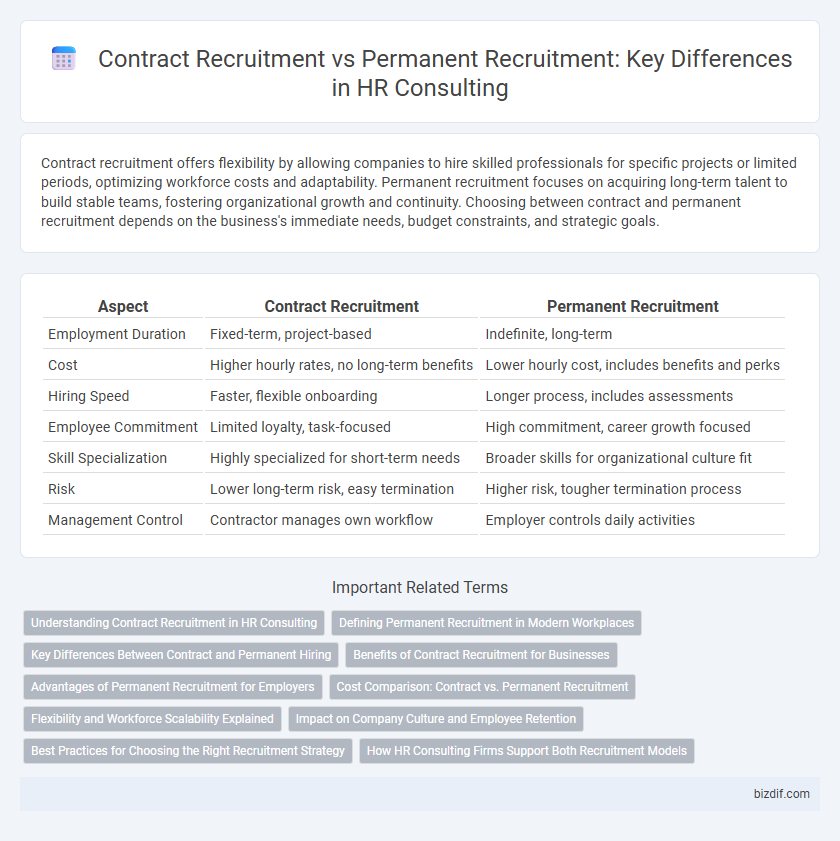Contract recruitment offers flexibility by allowing companies to hire skilled professionals for specific projects or limited periods, optimizing workforce costs and adaptability. Permanent recruitment focuses on acquiring long-term talent to build stable teams, fostering organizational growth and continuity. Choosing between contract and permanent recruitment depends on the business's immediate needs, budget constraints, and strategic goals.
Table of Comparison
| Aspect | Contract Recruitment | Permanent Recruitment |
|---|---|---|
| Employment Duration | Fixed-term, project-based | Indefinite, long-term |
| Cost | Higher hourly rates, no long-term benefits | Lower hourly cost, includes benefits and perks |
| Hiring Speed | Faster, flexible onboarding | Longer process, includes assessments |
| Employee Commitment | Limited loyalty, task-focused | High commitment, career growth focused |
| Skill Specialization | Highly specialized for short-term needs | Broader skills for organizational culture fit |
| Risk | Lower long-term risk, easy termination | Higher risk, tougher termination process |
| Management Control | Contractor manages own workflow | Employer controls daily activities |
Understanding Contract Recruitment in HR Consulting
Contract recruitment in HR consulting involves sourcing and placing professionals for fixed-term projects or assignments, offering businesses flexibility to scale their workforce based on demand. This approach reduces long-term obligations and allows organizations to access specialized skills quickly, optimizing operational efficiency. HR consultants manage candidate screening, contract negotiations, and compliance to ensure that contract hires align with client needs and regulatory standards.
Defining Permanent Recruitment in Modern Workplaces
Permanent recruitment involves hiring employees for ongoing, long-term positions that contribute to the sustained growth and stability of an organization. This process prioritizes cultural fit, skills alignment, and potential for career development within the company, ensuring a committed workforce. Modern workplaces leverage advanced HR technologies and strategic sourcing to identify candidates who align with organizational goals and values.
Key Differences Between Contract and Permanent Hiring
Contract recruitment involves hiring employees for a specified period to meet short-term project needs, offering flexibility and cost-efficiency for companies with fluctuating workloads. Permanent recruitment focuses on long-term employment, emphasizing cultural fit, career development, and stability, which supports sustained organizational growth. Key differences include the duration of employment, benefits entitlement, and recruitment process complexity, with contract roles typically requiring faster onboarding and limited benefits compared to permanent positions.
Benefits of Contract Recruitment for Businesses
Contract recruitment offers businesses enhanced flexibility by allowing them to quickly scale their workforce according to project demands without long-term commitments. It reduces overhead costs related to benefits, pensions, and severance, making it a cost-effective option for managing fluctuating workloads. This approach also provides access to specialized talent for short-term projects, improving operational efficiency and agility.
Advantages of Permanent Recruitment for Employers
Permanent recruitment offers employers greater employee retention and stability, reducing turnover costs and enhancing workforce continuity. Long-term hires often develop deeper company knowledge and stronger organizational commitment, leading to higher productivity and improved team cohesion. Employers also benefit from fostering a consistent corporate culture and attracting top talent motivated by career growth opportunities.
Cost Comparison: Contract vs. Permanent Recruitment
Contract recruitment often incurs higher hourly or project-based rates but reduces long-term expenses such as benefits, taxes, and severance. Permanent recruitment requires upfront costs including recruitment fees, onboarding, and ongoing salaries with benefits, making it a larger financial commitment over time. Organizations must analyze total cost of ownership by factoring in flexibility, retention, and potential turnover when choosing between contract and permanent hiring.
Flexibility and Workforce Scalability Explained
Contract recruitment offers enhanced flexibility by enabling organizations to quickly scale their workforce up or down based on project demands or market fluctuations, minimizing long-term commitments. Permanent recruitment focuses on building a stable, committed workforce that supports sustained business growth but requires longer hiring processes and increased investment in employee development. Balancing contract and permanent hires allows HR teams to optimize workforce scalability while maintaining operational agility and controlling labor costs.
Impact on Company Culture and Employee Retention
Contract recruitment offers flexibility that allows companies to quickly adapt to project demands without long-term commitments, minimizing disruption to existing company culture but potentially creating a transient workforce. Permanent recruitment fosters deeper integration and alignment with organizational values, enhancing employee engagement and long-term retention. Companies prioritizing sustained cultural cohesion and stability often benefit from investing in permanent hires to build a committed and cohesive workforce.
Best Practices for Choosing the Right Recruitment Strategy
Evaluating the specific workforce needs and project duration is crucial when choosing between contract and permanent recruitment strategies. Contract recruitment offers flexibility and cost-efficiency for short-term projects, while permanent recruitment ensures long-term employee retention and cultural fit. Integrating data-driven assessments and aligning recruitment choices with organizational goals optimizes talent acquisition outcomes.
How HR Consulting Firms Support Both Recruitment Models
HR consulting firms provide tailored strategies to optimize contract recruitment by identifying skilled temporary talent that meets short-term project needs efficiently. They also support permanent recruitment through comprehensive candidate screening, cultural fit assessment, and long-term workforce planning to secure lasting employee retention. Leveraging advanced recruitment technologies and market insights, HR consultants enhance hiring accuracy across both contract and permanent recruitment models.
contract recruitment vs permanent recruitment Infographic

 bizdif.com
bizdif.com